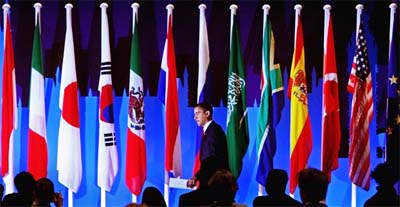The argument for more international public goods is based on evidence of under-financing of research to generate urgently needed technological breakthroughs, citing the decline of the internationally funded Consultative Group on International Agricultural Research (CGIAR) network of research institutions (including the Hyderabad-located International Crops Research Institute for the Semi-Arid Tropics [ICRISAT]) due to inadequate international financing.
Subramanian notes that there are many sources of aid finance to individual economies, including the bulk of funds from international financial institutions, but there are not enough sources for funding international public goods.
It is not surprising that international public goods are undersupplied in the absence of a world government. The United Nations does raise and allocate funds for some goods. However, few would argue that the various arms of the United Nations are meeting the need, or that the United Nations will be able to rectify this problem with its current structure and support.
The G20 could catalyse more resources. This new forum contains a diverse and representative group of influential governments and the inclusion of emerging economic giants gives it potential legitimacy. Subramanian’s recommendation that the G20 should be challenged to add to the supply of international public goods is timely. His essay could serve as the basis for a detailed proposal.
Such a proposal can go well beyond changing the composition of World Bank lending or the creation of a possible new arm of the Bank. Subramanian sees the latter option as a means of achieving a better balance of control over the World Bank, but this governance objective can be pursued by other means.
Lending through any international financial institution is not necessarily the only way, or the most efficient way, to supply international public goods. For example, the extent and potential sharing of the benefits from agricultural research cannot be anticipated accurately. So who would undertake to borrow funds to help support through the CGIAR?
There are international public goods where a commercial rate of return can be reasonably certain and the beneficiaries can be identified. The World Bank has drawn attention to a potential annual gain of US$280 billion which could be achieved by bringing the efficiency of all Asia Pacific economies ports up to no more than half of the best practice already achieved at some ports.
This represents a significant market failure, some of which could be corrected by supplying international public goods; by sharing the experience, skills and technology (particularly software) used in current best practice. But it is very hard to assemble a group of governments prepared to borrow funds to finance such pooling of information, experience, expertise and technology. It may, however, be possible for some governments to contribute to financing such an effort and some of these funds could be recouped by a modest levy on operators of shipping through improved ports.
If the G20 does decide to help enhance financing of international public goods, its governments could begin by contributing tiny, but equal, shares of their GDP which would be administered by a G20 Fund, with governance to reflect their contributions.
Potential recipients of financing from a G20 Fund could include:
• existing institutions which merit support, such as the CGIAR;
• new international research institutions, for example to fund research and development of sustainable sources of energy;
• some United Nations activities considered to be effective;
• and where feasible, lending to groups of governments through existing international financial institutions.
G20 governments are not likely to contribute to financing international public goods unless there is adequate assurance of expected benefits. Subramanian’s essay notes that it is awfully hard to find evidence in traditional World Bank–type aid works.
‘In a series of papers, Raghuram Rajan, former chief economist of the IMF, and I were unable to find any positive effects of aid on long-run growth but did find evidence consistent with some of the negative effects of aid in depressing manufacturing exports and worsening domestic institutions,’ he writes
A proposal to the G20 will need to be backed by evidence that financing international public goods has been, and can be expected to continue to be, more effective than past aid to individual governments.


The development process is very complex and there are so many factors that can contribute to both the failures and successes of a country’s development.
The statement “In a series of papers, Raghuram Rajan, former chief economist of the IMF, and I were unable to find any positive effects of aid on long-run growth but did find evidence consistent with some of the negative effects of aid in depressing manufacturing exports and worsening domestic institutions,’ does not necessarily prove that the proposed alternatives will be able to achieve better outcomes than what the world bank has done in the past.
Firstly, there is no surety that the findings of that study are correct, given the so many factors in play.
Secondly, if specifically targeted aids cannot achieve positive long run growth, how can one reasonably think that the proposed by increasing the provisions of public goods by international financial organisations will do a better job to promote long run growth? Weren’t public goods available in the past? Why will new public goods be different?
The proposal will make the link between inputs and outputs/outcomes much more weak and less transparent. It is unbelievable that will work.
It is like to treat a particular disease, the specifically developed medicine is only effective to some patients but not all patients. Now let’s try something different. How about using a medicine that is for general health to cure that particular disease?
Will that approach work? Few would agree, probably. At least conventional logic suggests it will not.